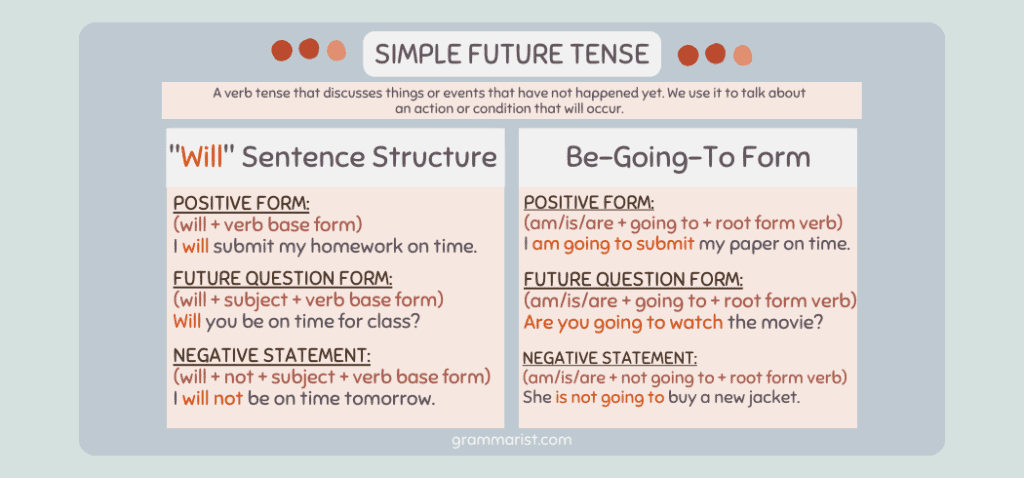When to use “will” and “going to” can be confusing for English learners. This blog post will explain the differences between the two phrases, give some examples, and provide a worksheet for practice. Understanding these two phrases’ differences will help you improve your English fluency.
Will vs. Going To

The real difference in meaning between “will” and “going to” lies in their time frames. In spelling and grammar rules, “will” is commonly used in formal settings and often depicts a certain action that will happen soon. It’s usually more spontaneous than “be going to,” which refers to future events that have been planned.
What Tense Is “Be Going To”?
“Be going to” is one of the two ways to form a simple future in English grammar. To form sentences with this phrase, you use am/is/are + going to + root form of the verb you want to convey.
Example:
- We are going to study for tomorrow’s test.
- I am not going to badmouth my classmates.
How Do You Use “Be Going To”?
When I use the phrase “be going to,” I’m indicating that a certain action or event will take place in the near future. This phrasing is typically used when there is little uncertainty about what will happen next, such as in planning cases or when we have received clear signals that something is happening.
For example, suppose your boss tells you that you will be traveling to another city for an important meeting next week. In that case, you can use the expression “be going to” to express your plans for preparing for and participating in the meeting.
- I am going to travel to another city for an important meeting next week.
Similarly, suppose you notice dark rain clouds moving in on a particularly warm day and suspect it might rain soon. In that case, you might say, “it’s going to rain,” indicating your expectation based on past observations.
Note that “be going to” is typically used in non-formal speech, but it’s a very common way to express things that are going to happen.

Simple Future Tense With “Will”
The simple future tense is a commonly used verb tense in English, and it often uses the auxiliary verb “will” to indicate a specific action or event that will take place in the future. This can be a helpful way to communicate information and make predictions about what may happen in the days, months, or years ahead.
For example, if you wanted to say that you would be going on vacation next month, you might say something like, “I will go on vacation next month.” To make a simple future tense using “will,” just add the root form of the verb right after it.
How to Form the Simple Future Negative
When using “will,” we can form a simple future negative using the formula will + not + the root form of the verb you want to convey.
Examples:
- I will not go to Jen’s party this Saturday.
- Sarah will not buy a dog because she wants to adopt one.
Similarly, you can form the simple future negative of the phrase “be going to” using the formula am/is/are + not going to + the root form of the verb.
Examples:
- I am not going to attend Jen’s party this Saturday.
- Sarah is not going to buy a dog because she wants to adopt one.
How to Ask Questions in the Simple Future
The correct formula for asking questions using the simple future is will + subject + root for of the verb.
Examples:
- Will you come to the show with us next week?
- Will Susan go on a date with Jim?
- How will you pay for all these products?
If you want to use the phrase “be going to” when asking a question, the formula is am/is/are + subject + going to + root form of the verb.
Examples:
- Are you going to come to the show with us next week?
- Is Susan going to go on a date with Jim?
- How are you going to pay for all these products?
The Final Words
The tense you use when discussing the future can greatly impact how your message is received. In this blog post, we’ve outlined the differences between “will” and “going to” and when it’s best to use each one.
Even if you feel confused at first, it’s not the biggest mistake you can make when learning English, I promise. To summarize the difference between “will” and “going to,” use “will” when you want to show spontaneous decisions and “be going to” for previous plans, evidence, and predictions.